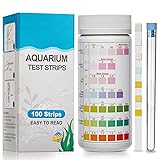All Categories





Apera Instruments 5052 Saltwater Salinity Tester (0-100 PPT, ±1.5% Accuracy) for Aquariums, Aquaculture, & Environmental Monitoring
Share Tweet
Get it between 2025-01-20 to 2025-01-27. Additional 3 business days for provincial shipping.
*Price and Stocks may change without prior notice
*Packaging of actual item may differ from photo shown
- Electrical items MAY be 110 volts.
- 7 Day Return Policy
- All products are genuine and original
- Cash On Delivery/Cash Upon Pickup Available








Apera Instruments 5052 Saltwater Salinity Tester Features
-
Dip and test – the easiest way to get reliable saltwater salinity readings (range: 0-100 ppt; accuracy: 1. 5 percent of full range)
-
Apera's unique platinum-coated sensor with automatic temperature compensation (32 to 140˚F) ensures accuracy and precision
-
Designed for aquariums, fish farms, and environmental monitoring
-
Single-button operation. Calibration is only needed once every month
-
Standardized against the normal standard seawater (s = 35), accurately calibrated in conductivity ratio (K15) and in salinity
About Apera Instruments 5052 Saltwater Salinity Tester
Description Apera 5052 Saltwater Salinity Tester is designed for easy and reliable salinity measurements for aquarium, aquaculture, and environmental monitoring. Apera’s unique platinum-coated sensor with automatic temperature compensation (ATC) ensures accuracy and precision of the measuring results in a wide range –an accuracy of 1. 5% of full range in 0 to 100 ppt (=100, 000 ppm). The dip-and-test is the easiest way to get reliable saltwater salinity readings (vs. hydrometers and refractometers). Sample test is not required. Just dip the meter into saltwater and get stable readings in 10 seconds. No need for rinsing between each tests. Say goodbye to frequent calibration. Calibrating the meter once every month will give you reliable results. Calibration solution is included in the kit. The meter is designed with a single-button operation powered by 2*AAA batteries. Auto. Power-off and low-battery reminder functions are available. Comes with a complete kit including the 5052 tester, 2 AAA Alkaline batteries, 50 MS/cm calibration solution, and a carrying case. 2-year with the instrument and 6-month with the sensor. Note: The Apera 5052 tester measures practical salinity (NOT absolute salinity) converted from conductivity using The Practical Salinity Scale 1978 (PSS-78) and is standardized against the Normal Standard Seawater (S=35), which is accurately calibrated in conductivity ratio (K15). The PSS-78 is recommended by all oceanographic organizations as the scale in which to report salinity data.





















